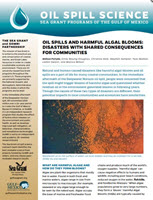
The Sea Grant Oil Spill Outreach Team released a publication that discusses the concerns that people had about harmful algae blooms (HABS) being triggered by residual oil from the Deepwater Horizon incident. HABs have occurred after oil spills in the past, but the relationship between the two is not always clear.
Read Oil Spills and Harmful Algal Blooms: Disasters with Shared Consequences for Communities to learn about the formation of HABS and the similarities and differences between HABS and oil spills, including environmental factors, duration and persistence, tools for tracking and forecasting their movement, response agencies, and community impacts (seafood and public health safety, economic toll on fisheries, tourism, and recreational activities). Also discussed are potential ways that the frequency of HABS might potentially increase due to sea level rise, increased rainfall, and rising ocean temperatures.
Check out these Sea Grant publications that also discuss the relationships among disasters and oil spills: Storms and Spills and Fisheries Landings and Disasters in the Gulf of Mexico.
The Sea Grant Oil Spill Outreach Team synthesizes peer-reviewed science for a broad range of general audiences, particularly those who live and work across the Gulf Coast. Sea Grant offers oil-spill related public seminars across the United States.
Information about upcoming Sea Grant science seminars and recently held events is available here. To receive email updates about seminars, publications, and the outreach team, click here.
By Nilde Maggie Dannreuther. Contact maggied@ngi.msstate.edu with questions or comments.
************
GoMRI and the Sea Grant programs of the Gulf of Mexico (Florida, Mississippi-Alabama, Louisiana, and Texas) have partnered to create an oil spill science outreach program.
The Gulf of Mexico Research Initiative (GoMRI) is a 10-year independent research program established to study the effect, and the potential associated impact, of hydrocarbon releases on the environment and public health, as well as to develop improved spill mitigation, oil detection, characterization and remediation technologies. An independent and academic 20-member Research Board makes the funding and research direction decisions to ensure the intellectual quality, effectiveness and academic independence of the GoMRI research. All research data, findings and publications will be made publicly available. The program was established through a $500 million financial commitment from BP. For more information, visit http://gulfresearchinitiative.org/.
© Copyright 2010-2020 Gulf of Mexico Research Initiative (GoMRI) – All Rights Reserved. Redistribution is encouraged with acknowledgement to the Gulf of Mexico Research Initiative (GoMRI). Please credit images and/or videos as done in each article. Questions? Contact web-content editor Nilde “Maggie” Dannreuther, Northern Gulf Institute, Mississippi State University (maggied@ngi.msstate.edu).
